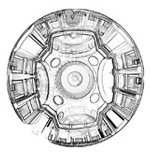
Roman Catholic Political Philosophy
THE CITY OF MAN & THE CITY OF GOD
Man transcends the city only by pursuing true happiness, not by pursuing happiness however understood. — Leo Strauss
Man qua man remains the same in primitive conditions as in technologically developed societies and does not advance to a higher level simply by the fact that he has learned to employ more highly developed tools. Human nature starts over from the beginning in every human being. Therefore there cannot be such a thing as a definitively new, advanced, and smooth-running society. Not only was this the hope of the grand ideologies, but it has been becoming more and more the general objective expected by all ever since hope in the hereafter was demolished. A definitively well-run society would presuppose the end of freedom. — Joseph Cardinal Ratzinger
The Catholic Church has never considered politics to be salvific. Active interest in politics came relatively late in Christian history. Indeed, for the first centuries of her existence, the Church’s main preoccupation was surviving in a hostile political setting. Participation in politics is also a late interest. Popular sovereignty and voting are, in the order of importance, almost of yesterday afternoon.
Christianity first appeared in the Roman Empire, which was an all-inclusive social and political system, though it periodically persecuted Christians, often thinking they were atheists. As in Acts 4, when John and Peter told the authorities that they would continue to preach even if forbidden, early Christians had to take some stance on how they would deal with a political order that had its own diverse gods, laws, and ways of life. It is not strange that early Christian writers saw something providential in pagan Rome, a polity within which the Savior was born — after all, Caesar Augustus’s decree that the whole world should be enrolled was the occasion of Mary and Joseph’s presence in Bethlehem, where Christ was born. With its ideals of common brotherhood, language, and laws, Rome was technically open to everyone; it had a universalism that Christianity would later build on — the popes, like the Roman emperors before them, speak Urbi et Orbi, to the “city and the world.”
“Christians are indistinguishable from other men either by nationality, language or customs,” the famous second-century Epistle to Diognetus tells us. “They do not inhabit separate cities of their own, or speak a strange dialect, or follow some outlandish way of life…. And yet there is something extraordinary about their lives. They live in their own countries as though they were only passing through. They play their full role as citizens, but labor under all the disabilities of aliens. Any country can be their homeland, but for them their homeland, wherever it may be, is a foreign country.”
Early Christians did not find much of interest in Roman politics. They hoped mainly to be left alone to lead quiet lives in whatever city they found themselves. While the Romans were the most worldly and political of peoples, the Christian homeland was not here.
You May Also Enjoy
Karl Marx had both harmful and useful lessons to pass on to his disciples. It…
Fear Not the Peddlers of Error... Dreams of Robot Love... A Tough Transition... Bull's Eye... The Comeback Is Here... Trump & Abortion: Guarded Optimism... Arguable Assertions... I Have Not Been "Played"... A Way Forward... A Jurist for All Seasons... Desiring the Death of Those They Should Love... and more
Hard Times In Seattle... I'm Back... Insulted By Avery Dulles... God Isn't A Marshmallow... Repression Is Needed Too...

